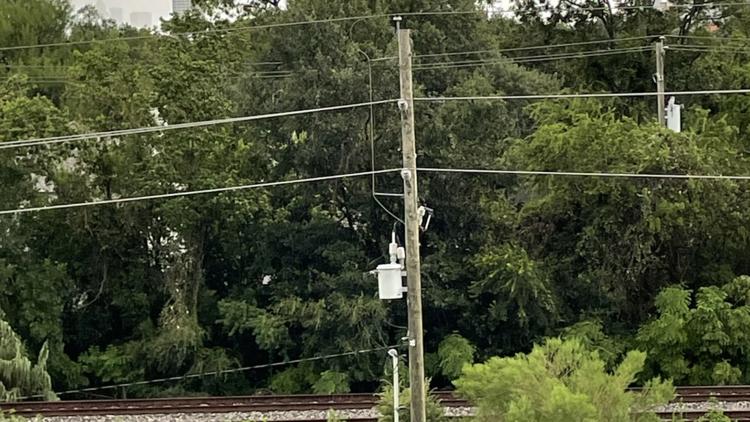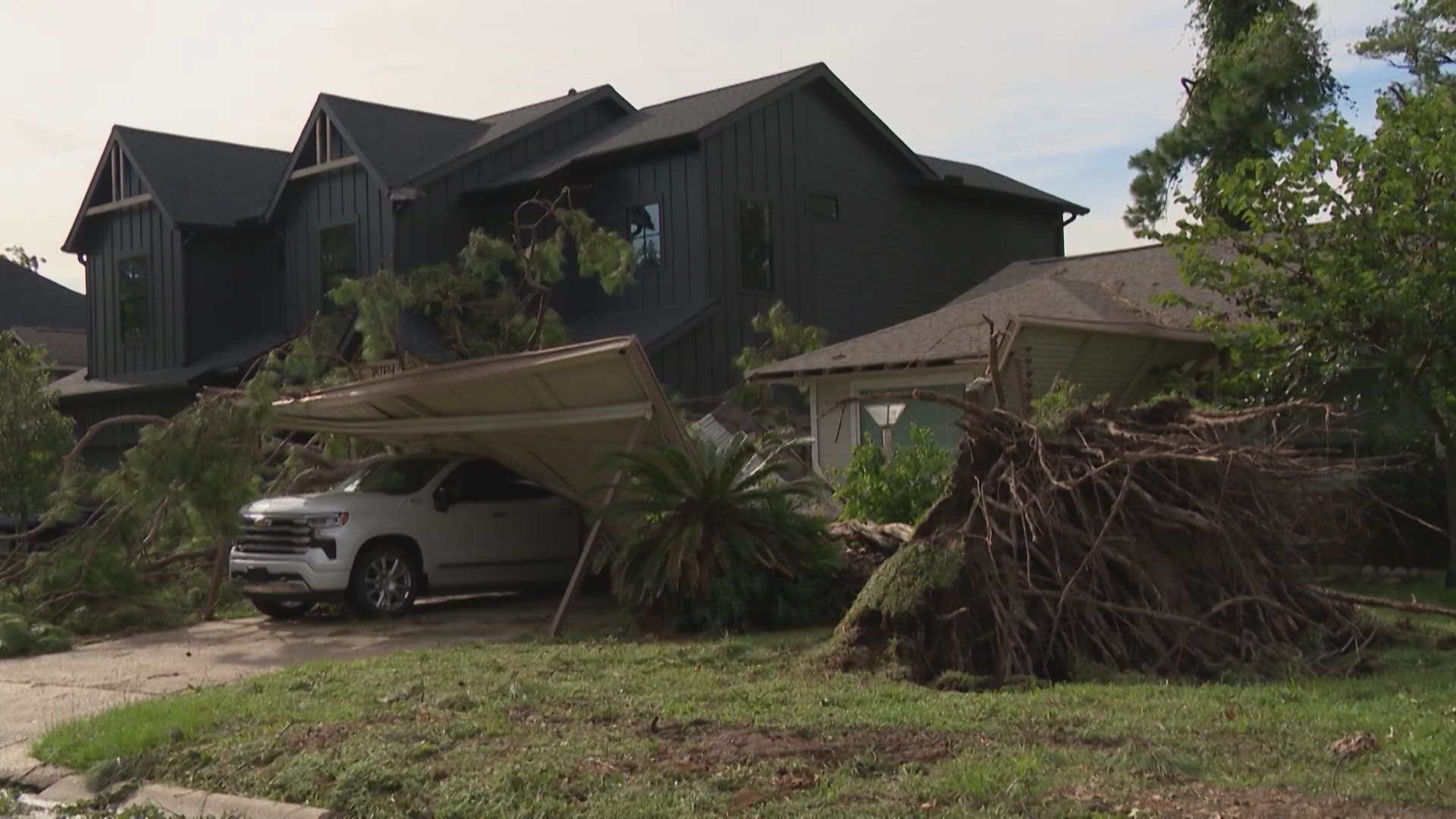HOUSTON — The extended power outages being endured by Houstonians and area residents are the product of extended neglect and underinvestment in electricity infrastructure. CenterPoint reports that its restoration efforts are ahead of its progress following Hurricane Ike, but that is irrelevant. Residents are paying more and getting less. And there are many misconceptions.
First, everyone needs to be considerate of the thousands of the workers who left their families and homes to come to Houston to repair the local grid. As a logistics effort, mobilizing 12,000 workers is equivalent to calling out an Army division. The difference is that an Army division is under one general with uniform equipment, uniform communications, uniform controls, and provisions for lodging and food service as part of the deployment.
Could CenterPoint have been better prepared? They say yes. Could the City of Houston and Harris County have been better prepared? They say yes. Keep in mind that repairing the power lines generally requires cleared roadways. Both the city and county appear to have been slow to act.
Casual observation of the CenterPoint outage map shows that most of the outages have been concentrated in the wooded areas of town, with few outages in the urban and industrial areas. We will know more when the after action reports are prepared.
CenterPoint
There are numerous criticisms of CenterPoint not plowing its profits back into the Houston grid. CenterPoint’s relevant Houston operations are under a separate company, CenterPoint Energy Houston Electric, LLC. CenterPoint’s businesses in natural gas and in other states are under no obligation to subsidize the company’s electricity operations in Houston. This makes sense, because no one in Houston would like to know that, for example, rates here are subsidizing customers in Indiana.
CenterPoint’s 2023 annual report touts the company’s efforts to reduce costs for its Houston customers.
“Maintained annual customer charge increases in our Houston Electric business at or below the historical level of inflation of 2% over the past 10 years.” (page 2 Annual Report).
“Furthermore in 2023, we upheld our goal of reducing operations and maintenance costs by 1-2% annually on average over our current 10-year plan to help maintain customer affordability. Our expense management discipline and strong organic customer growth, especially in our Greater Houston service territory, have helped us keep our Houston Electric customers’ average monthly charges nearly flat since 2014.” (page 3 2023 Annual Report).
The Public Utility Commission of Texas, the City of Houston, and Harris Country Commissioners Court can all see CenterPoint’s financial statement and should be asking questions about the company’s expenditures. For example, just to keep pace with inflation means expenditures should have been increasing. Why haven’t they?
The senior executive management of CenterPoint is led by accountants who previously worked at Pacific Gas & Electric. For years, Pacific Gas & Electric underinvested in the upkeep of its wires and pipelines. It was a financial decision that has killed dozens of people, caused billions of dollars in damages, and resulted in criminal charges for the company. (2010 San Bruno Pipeline Explosion, 2018 Camp Fire)
PG&E is not alone. Southern California Edison has paid the price for skimping on maintenance. (2017 Thomas Fire). In Dallas, Atmos Energy’s lack of maintenance and responsiveness led to a fatal explosion. (2018 Dallas pipeline explosion). In the Princeton University Press book Corporate Profit and Nuclear Safety: Strategy at Northeast Utilities in the 1990s Yale economists Paul W. MacAvoy and Jean Rosenthal showed that the executive management and board of directors of Northeast Utilities reduced operations and maintenance costs at the expense of safe operations at three nuclear power plants. The company pled guilty to felonies, paid millions in fines, and spent well over $1 billion to bring the Millstone 2 and Millstone 3 plants back into compliance with safe operating procedures. Millstone 1 could not be salvaged.
The Regulatory Compact—Who Represents the Public?
With the evidence of what happens when other utilities skimp on operations and maintenance expenditures, whose job is it to look out for the Houston consumer? CenterPoint is directly regulated by the Public Utility Commission of Texas, the City of Houston, and Harris County Commissioners Court. These appointed and elected officials are fiduciaries for the public interest. This means more than just overseeing the rates that consumers pay. It means making sure that CenterPoint provides the services it is supposed to provide. But here, we have what economists call the Principal-Agent Problem, wherein the executive management has an agenda that differs from that of its constituency (see, for example, the 1979 book The Regulated Industries and the Economy, by Paul W. MacAvoy). Elected officials are concerned with being re-elected and typically work to reduce costs to voters. Expediency is the order of the day.
The PUCT, City of Houston, and Harris County Commissioners Court know all there is to know about fatalities and degraded public safety when the local grid goes offline. Since Texas leadership first began to focus on costs at the expense of safety and reliability more than 20 years ago, Texans have suffered repeatedly.
That is to say, the blackouts caused by the May derecho and Hurricane Beryl are not entirely the responsibility of CenterPoint. Our elected leadership is culpable too.
National Security Concerns
The media have reported that CenterPoint was recently turned down by the Department of Energy for a $100 million grant to upgrade its infrastructure. Further, the PUC was also denied a $300 million grant to upgrade CenterPoint and other area utilities that serve our petrochemical and refineries complex along the Texas Gulf Coast. While the reasons for the denials are unclear, there is no question that a more resilient grid along the Texas Gulf Coast is a national security priority. Everyone recalls that states from Louisiana to New York and all along the Atlantic seaboard were panicked when the Colonial Pipeline was offline for a few days due to a ransomware attack. Why? The Colonial Pipeline can carry up to 3 million barrels per day of gasoline, jet fuel, or diesel to its system. If the local grid here in Houston goes down for an extended time, the pipeline and the refineries that feed it will also go down. That would be devastating for the states, and people, along the pipeline’s route.
Action Needed Now
Political rhetoric and finger-pointing hearings are not the solution. The solution is to require a change in attitude by state and local leaders and a change in priorities by CenterPoint. To protect our local electricity infrastructure, the trees and vegetation must be cut back and kept cut back. Old pine utility poles must be replaced. While some suggest that burying power lines is a solution, the costs may be prohibitive for all but the most critical parts of the region.
Ratepayers will certainly shoulder much of the costs of a comprehensive cleanup, but the city, county and state should pass statutes requiring that property owners with vines and trees in CenterPoint’s easements be charged for tree removals. If a property owner’s tree collapses across a CenterPoint power line, the property owner should be held liable for the cleanup and repair. If the property owner cannot pay at that instant, the utility can file a lien to recover the cost of vegetation removal when the property is sold later. (Not just private property owners—we can all see by driving around Houston that the city itself has trees planted in the utilities easements too!)
It is not acceptable for Houstonians to be facing the same sort of recovery time from Beryl as we did with Category 3 Hurricane Alicia in 1983. The prospect of a very busy 2024 hurricane season is a reason for taking action now.
About the author
Ed Hirs is a lecturer with the Department of Economics at the University of Houston. He teaches energy economics to undergraduate and graduate students. He is also KHOU 11's Energy Expert. You can read more about Ed Hirs here.
RELATED: Power outages from Hurricane Beryl stall production at longtime southwest Houston catering business
RELATED: Full Beryl coverage



